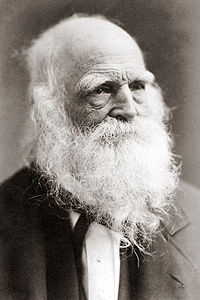The Disinterred Warrior
Gather him to his grave again,
And solemnly and softly lay,
Beneath the verdure of the plain,
The warrior's scattered bones away.
Pay the deep reverence, taught of old,
The homage of man's heart to death;
Nor dare to trifle with the mould
Once hallowed by the Almighty's breath.
The soul hath quickened every part--
That remnant of a martial brow,
Those ribs that held the mighty heart,
That strong arm--strong no longer now.
Spare them, each mouldering relic spare,
Of God's own image; let them rest,
Till not a trace shall speak of where
The awful likeness was impressed.
For he was fresher from the hand
That formed of earth the human face,
And to the elements did stand
In nearer kindred, than our race.
In many a flood to madness tossed,
In many a storm has been his path;
He hid him not from heat or frost,
But met them, and defied their wrath.
Then they were kind--the forests here,
Rivers, and stiller waters, paid
A tribute to the net and spear
Of the red ruler of the shade.
Fruits on the woodland branches lay,
Roots in the shaded soil below,
The stars looked forth to teach his way,
The still earth warned him of the foe.
A noble race! but they are gone,
With their old forests wide and deep,
And we have built our homes upon
Fields where their generations sleep.
Their fountains slake our thirst at noon,
Upon their fields our harvest waves,
Our lovers woo beneath their moon--
Then let us spare, at least, their graves!
Font size:
Submitted on May 13, 2011
Modified on March 05, 2023
- 1:20 min read
- 42 Views
Quick analysis:
| Scheme | XAXABCBC DEDEFGFG HIHIJKJK XLXLAMAM XNXNOPOP |
|---|---|
| Closest metre | Iambic tetrameter |
| Characters | 1,402 |
| Words | 264 |
| Stanzas | 5 |
| Stanza Lengths | 8, 8, 8, 8, 8 |
Translation
Find a translation for this poem in other languages:
Select another language:
- - Select -
- 简体中文 (Chinese - Simplified)
- 繁體中文 (Chinese - Traditional)
- Español (Spanish)
- Esperanto (Esperanto)
- 日本語 (Japanese)
- Português (Portuguese)
- Deutsch (German)
- العربية (Arabic)
- Français (French)
- Русский (Russian)
- ಕನ್ನಡ (Kannada)
- 한국어 (Korean)
- עברית (Hebrew)
- Gaeilge (Irish)
- Українська (Ukrainian)
- اردو (Urdu)
- Magyar (Hungarian)
- मानक हिन्दी (Hindi)
- Indonesia (Indonesian)
- Italiano (Italian)
- தமிழ் (Tamil)
- Türkçe (Turkish)
- తెలుగు (Telugu)
- ภาษาไทย (Thai)
- Tiếng Việt (Vietnamese)
- Čeština (Czech)
- Polski (Polish)
- Bahasa Indonesia (Indonesian)
- Românește (Romanian)
- Nederlands (Dutch)
- Ελληνικά (Greek)
- Latinum (Latin)
- Svenska (Swedish)
- Dansk (Danish)
- Suomi (Finnish)
- فارسی (Persian)
- ייִדיש (Yiddish)
- հայերեն (Armenian)
- Norsk (Norwegian)
- English (English)
Citation
Use the citation below to add this poem to your bibliography:
Style:MLAChicagoAPA
"The Disinterred Warrior" Poetry.com. STANDS4 LLC, 2024. Web. 23 Apr. 2024. <https://www.poetry.com/poem/40345/the-disinterred-warrior>.



Discuss the poem The Disinterred Warrior with the community...
Report Comment
We're doing our best to make sure our content is useful, accurate and safe.
If by any chance you spot an inappropriate comment while navigating through our website please use this form to let us know, and we'll take care of it shortly.
Attachment
You need to be logged in to favorite.
Log In